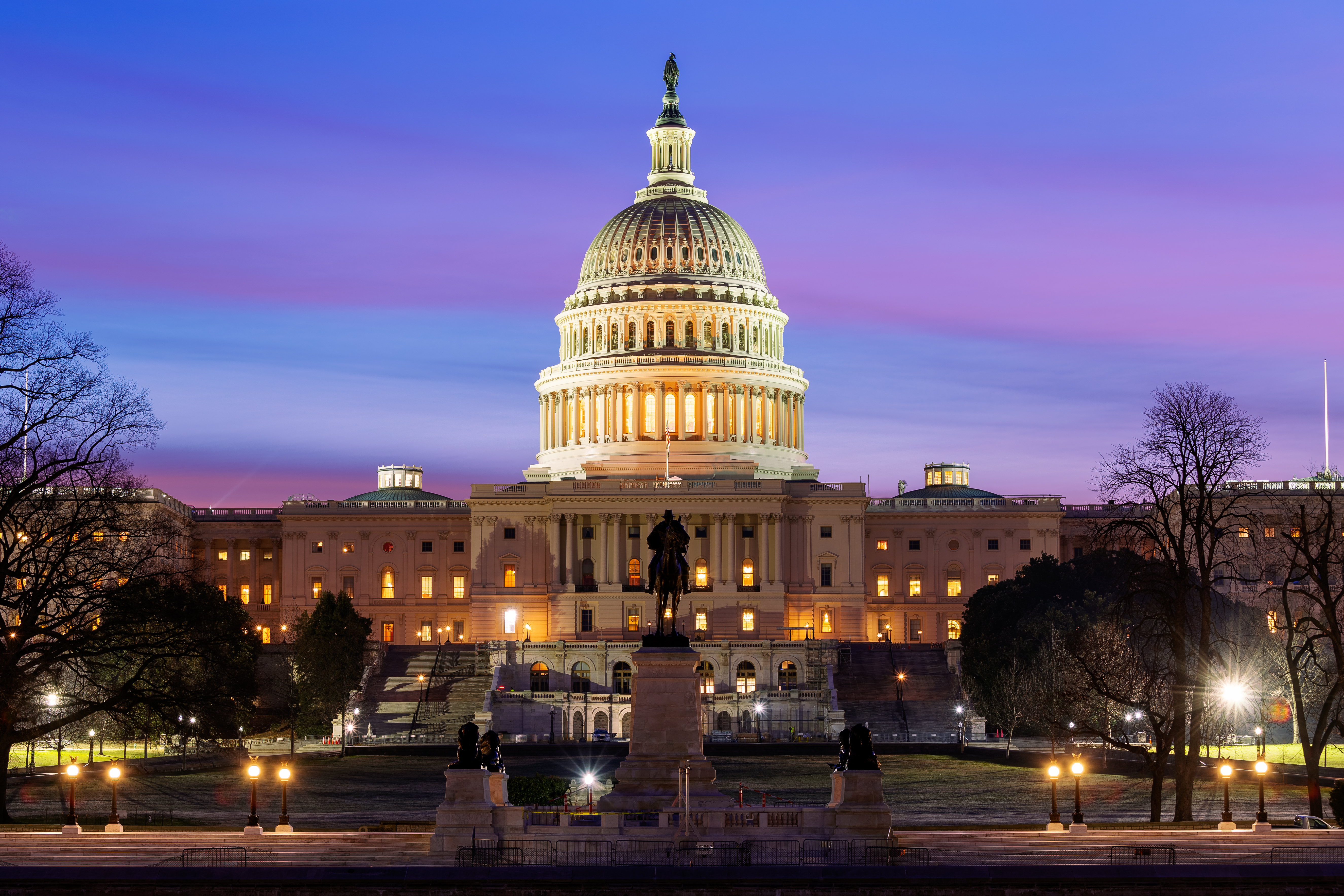Crypto arrives in Washington D.C.

All eyes are on Washington as Congress debates crypto legislation. [Joe Daniel Price via Getty Images]
In a saga that more closely resembled a pay-per-view boxing match than typical C-SPAN programming, the Senate just went several rounds over a crypto provision attached to its $1 trillion infrastructure bill. In this week’s Bytes we’re doing a play-by-play review and sharing some of the crypto community’s observations about the industry’s big week in Washington. Also this week: how to buy NFTs, and what happened after Ethereum’s big upgrade.
Washington wrestles with crypto
How to buy an NFT
The results of Ethereum’s upgrade
Crypto Goes to Washington
How crypto got wrapped up in the Senate’s $1T infrastructure bill — and what’s next
After months of negotiations, the Senate voted yesterday to approve the Biden Administration’s $1 trillion infrastructure plan — which aims to fix aging roads and bridges, fund ambitious broadband initiatives, and much more. Last week, a last-minute change to the crypto-tax provision was tacked onto the bill, rallying the crypto community to amend what they saw as an innovation-killing, overly broad mandate. The resulting saga included competing bipartisan amendments and nail-biting votes. Let’s see how it unfolded.
The controversy began when the crypto-tax provision’s language, which had been circulating for the last year, suddenly changed. The last-minute changes had two major consequences: (1) the definition of “broker” would now reach beyond U.S. crypto exchanges (like Coinbase) and (2) would impose reporting requirements that went beyond what is expected of 1099s from a traditional broker.
In a Twitter thread last week, Coinbase CEO Brian Armstrong acknowledged the importance of tax reporting but explained the provision’s shortcomings: “This means almost anyone in the crypto ecosystem (miners, validators, smart contracts, open source developers) could be treated as a ‘broker’ with massive reporting obligations … This makes no sense ... The infrastructure bill also imposes sweeping and unprecedented reporting requirements that will force exchanges like Coinbase and others to surveil its customer’s transactions in a way that is more intrusive than the rest of traditional finance.”
Crypto users flooded senate offices with calls and emails as crypto industry advocates in D.C. met with lawmakers. A letter protesting the last-minute changes garnered more than 120 signatories ranging from non-profits and trade associations to individual companies. Groups from across the political spectrum, from the Electronic Frontier Foundation to the Americans for Tax Reform, denounced the hasty legislation.
Senators Cynthia Lummis (R-Wyo.), Ron Wyden (D-Ore.), and Pat Toomey (R-Penn.) proposed an amendment to narrow the term “broker” last Wednesday. Many rallied behind the amendment, which exempted protocol developers, validators, and software and hardware wallet makers from the original tax reporting obligations.
Senators Rob Portman (R-Ohio), Mark Warner (D-Va.) and Kyrsten Sinema (D-Ariz.) responded Thursday with a competing amendment that favored proof of work protocols over others (like proof of stake). Though many criticized the amendment for “picking winners and losers,” the White House endorsed it.
On Monday, five of the six senators proposed a last-minute compromise amendment brokered with the Treasury Department. The amendment seemed poised to pass, in a major victory for bipartisan cooperation in our polarized political era.
But the compromise failed to garner the unanimous consent required by procedural rules. A single GOP senator, Alabama’s Richard Shelby, tanked the amendment by demanding it be packaged with a procedural vote on his amendment for $50 billion in additional military spending. In a tweet later that day, Lummis thanked her cosponsors “for fighting with me for the innovators that make our country great. The fight isn’t over. It always takes work to convince skeptics of the merits of new technology.”
Why it matters… Regardless of the bill’s outcome as it moves on to the House of Representatives, the debate has been revelatory. Crypto users emerged as a powerful grassroots political constituency. The crypto industry and a bipartisan group of senators collectively grappled with complicated tech concepts, signalling a growing understanding of the stakes. “Shutting off this growth engine would be the equivalent of stopping e-commerce in 1995 because people were afraid of credit card fraud,” noted entrepreneur Mark Cuban. “Or regulating the creation of websites because some people initially thought they were complicated and didn't understand what they would ever amount to."
I Want My NFT
NFTs are booming. Here’s how to buy one
From CryptoPunks and pet rocks to Katy Perry and Spider-Man, this summer's NFT boom has yet to slow down. In the last seven days, around $300 million has flowed into NFT markets, according to Nonfungible.com. Which is a lot when you consider that most people have no idea how to actually buy one. Even though NFT markets aren’t exactly Amazon when it comes to ease of use, buying your first digital collectible isn’t hard — it just requires a little guidance. Here’s how it works.
You’ll need an Ethereum-compatible crypto wallet and some ETH to get started. Buy some ETH from an exchange like Coinbase and send it to Coinbase Wallet (which is separate from the main Coinbase app; you can download it via Apple’s App Store or Google Play).
Follow the simple instructions to set up your wallet – which is a place you can keep crypto, a way to send or receive it, and your portal to the growing universe of crypto apps. (You can also download this Chrome extension to connect Coinbase Wallet to a web browser if you’d rather browse NFTs on a computer).
There are lots of NFT markets, from Rarible to Mintable. For this tutorial we’ll focus on OpenSea — which is the biggest of them all, and works a lot like a decentralized eBay. To connect your wallet to OpenSea, go to OpenSea.io, click on the icon in the top right, and select “My Profile” — you’ll be prompted (and given instructions) to connect your wallet.
Get browsing! Prices range from essentially free (for this Calvin Coolidge trading card) to hundreds of thousands of dollars or more for a rare item. Some items are sold via auction, while others can be snagged immediately via a “buy now” button.
Even if the NFT is free or cheap, you’ll still have to pay fees to make the transaction happen. Most of the digital collectibles on OpenSea use the Ethereum blockchain, and the network charges a “gas” fee for transactions like NFT sales. Gas prices rise and fall depending on how busy the network is.
Choose an NFT you like and make sure you have extra ETH to cover fees. Say you want one of these Crypto Bumblebees for .01 ETH — maybe you like “cute and fabulous bumblebees,” or you hope the sleepy bee market will one day go ape. Regardless, once you buy it, you can access the NFT via your crypto wallet until you decide to sell it.
Why it matters… NFTs make the sale of rare, unique digital assets possible for the first time — and can be programmed with all sorts of useful features (allowing creators to participate in secondary-market sales, for instance). They’ve also offered early adopters some eye-popping returns. But most people aren’t going to jump through hoops just to buy a digital collectible. As one of Rarible’s founders noted recently, even megabrands like Coca Cola haven’t yet figured out how to make NFTs relevant to mass audiences. "It's still not for the consumer," he said. "Big businesses that have intellectual property need to figure out what [will speak] to their audience.”
Feel the Burn
How Ethereum’s big upgrade is going so far
Last week, Ethereum underwent its biggest protocol upgrade in years. One shift, called EIP-1559, changes the cryptocurrency’s basic economics by “burning” the ETH used to pay transaction fees, which will reduce ETH’s total supply over time.
So far? It’s been smooth sailing. As of Tuesday afternoon, about 25,000 ETH — worth around $80 million — have been removed from the supply since the August 5 upgrade. ETH’s price has also spiked past the $3,000 mark last seen in May. The rally has even led some to speculate again about the prospect of “the flippening,” in which Ethereum’s market cap would one day eclipse Bitcoin’s.
Takes
Dogecoin-themed hot dogs sell for big money, AMC to accept bitcoin for movie tickets
And the wiener is… Someone bought a single pack of dogecoin-themed hot dogs on eBay for $15,001.00 during an Oscar Mayer charity auction. “The #DogeArmy sent our Hot Doge Wieners TO THE MOON,” the company tweeted.
That’s the ticket… Movie theater chain (and memestock benefactor) AMC will begin accepting bitcoin for tickets and concessions. “I’ve had to learn more in the past six months about blockchain and cryptocurrency than I learned about it in the entire decade before that,” said AMC’s CEO.
Peace on earth… After the Senate blocked Monday’s crypto amendment, Twitter and Square CEO Jack Dorsey tweeted “#Bitcoin will unite a deeply divided country. (and eventually: world).”
SEC clearly now… Meanwhile, SEC Chair Gary Gensler reaffirmed the need for clarity in crypto regulation. “While I’m neutral on the technology, even intrigued... I’m not neutral about investor protection,” he told Bloomberg last week. “It’s only with bringing things inside — and sort of clearly within our public policy goals — that a technology has a chance of broader adoption.”
TOKEN TRIVIA
What is proof of stake?
A
A way to verify data to shared from another computer
B
A consensus mechanism used by cryptocurrencies like Cardano to verify new transactions, add them to the blockchain, and create new tokens
C
Identification cards for vampire hunters
D
The process by which networks of mining computers generate new bitcoin
Find the answer below.
Trivia Answer
B
A consensus mechanism used by cryptocurrencies like Cardano to verify new transactions, add them to the blockchain, and create new tokens











